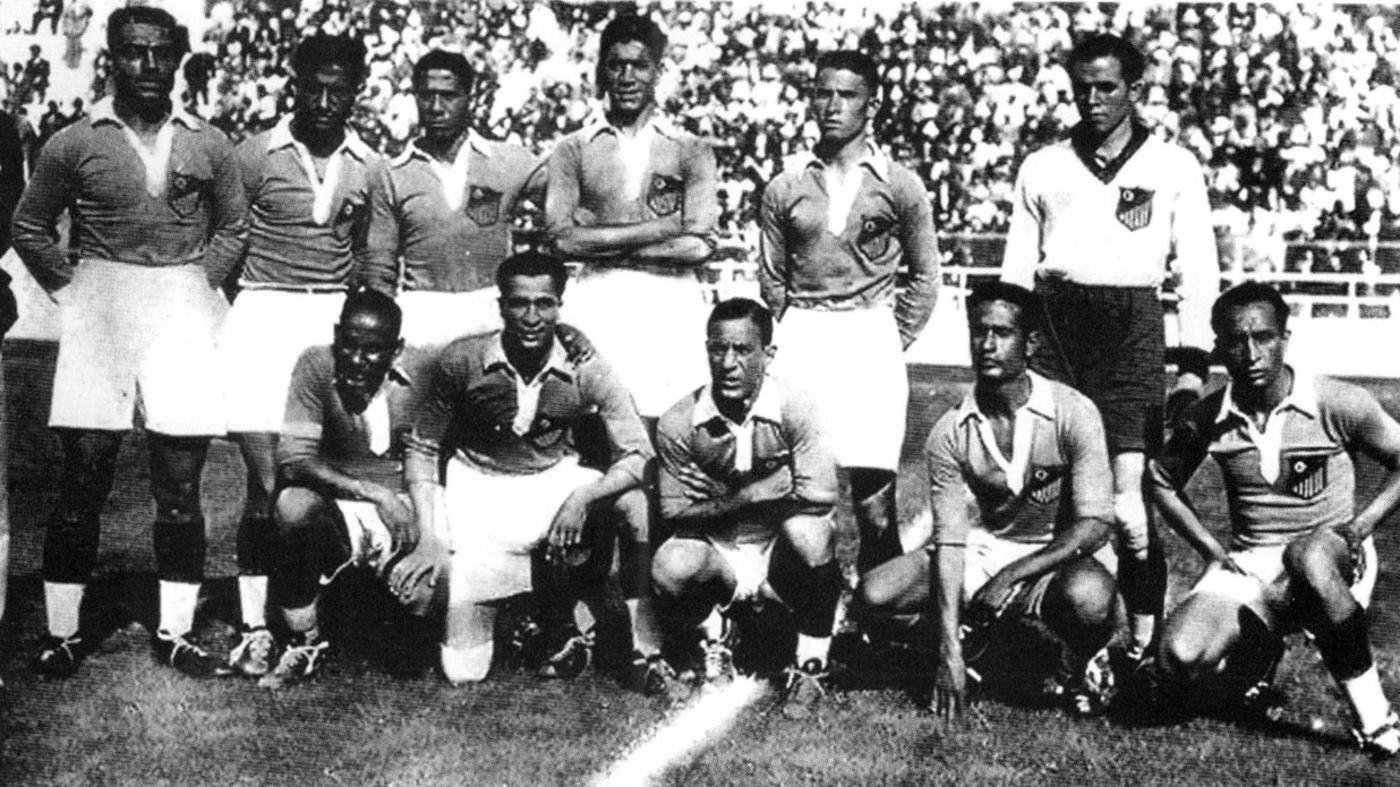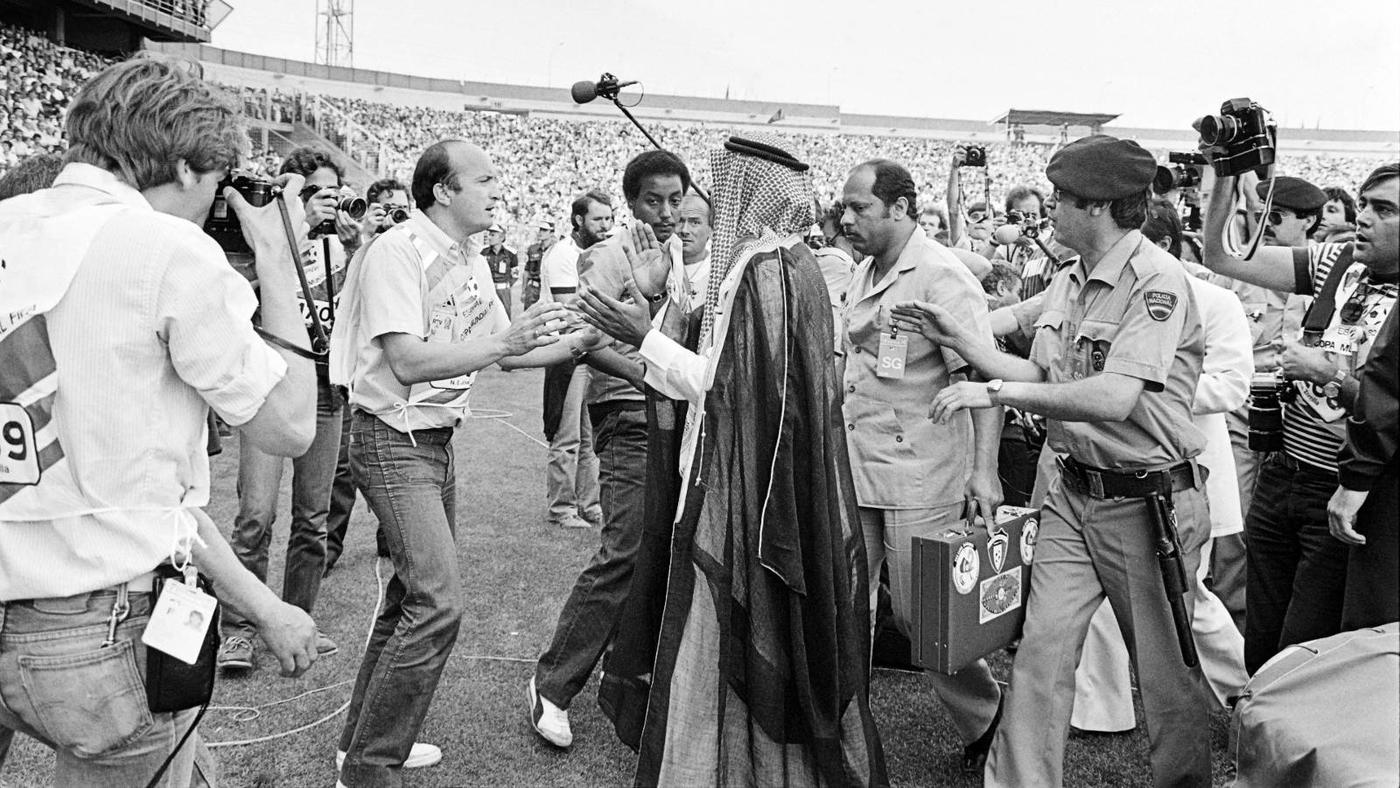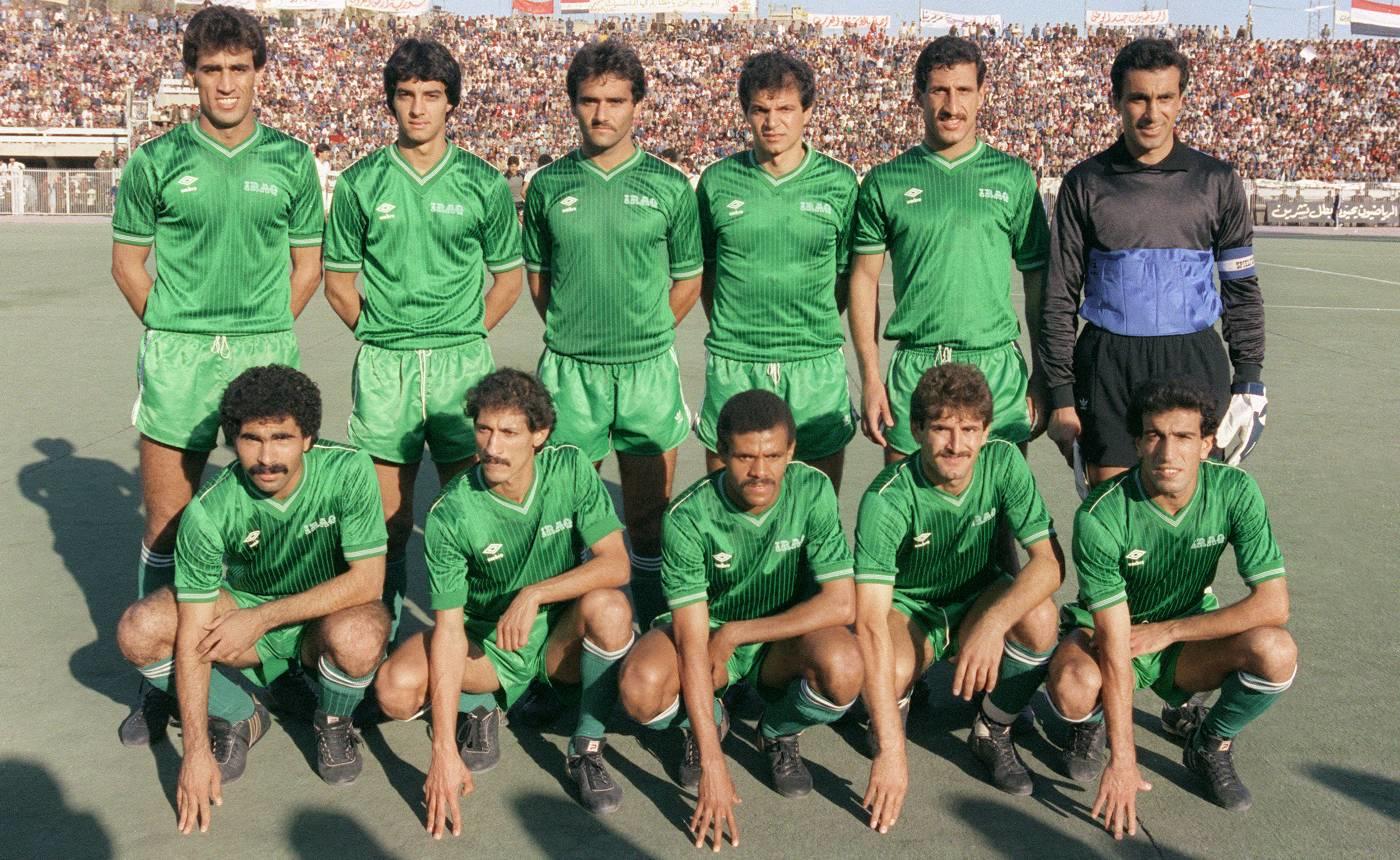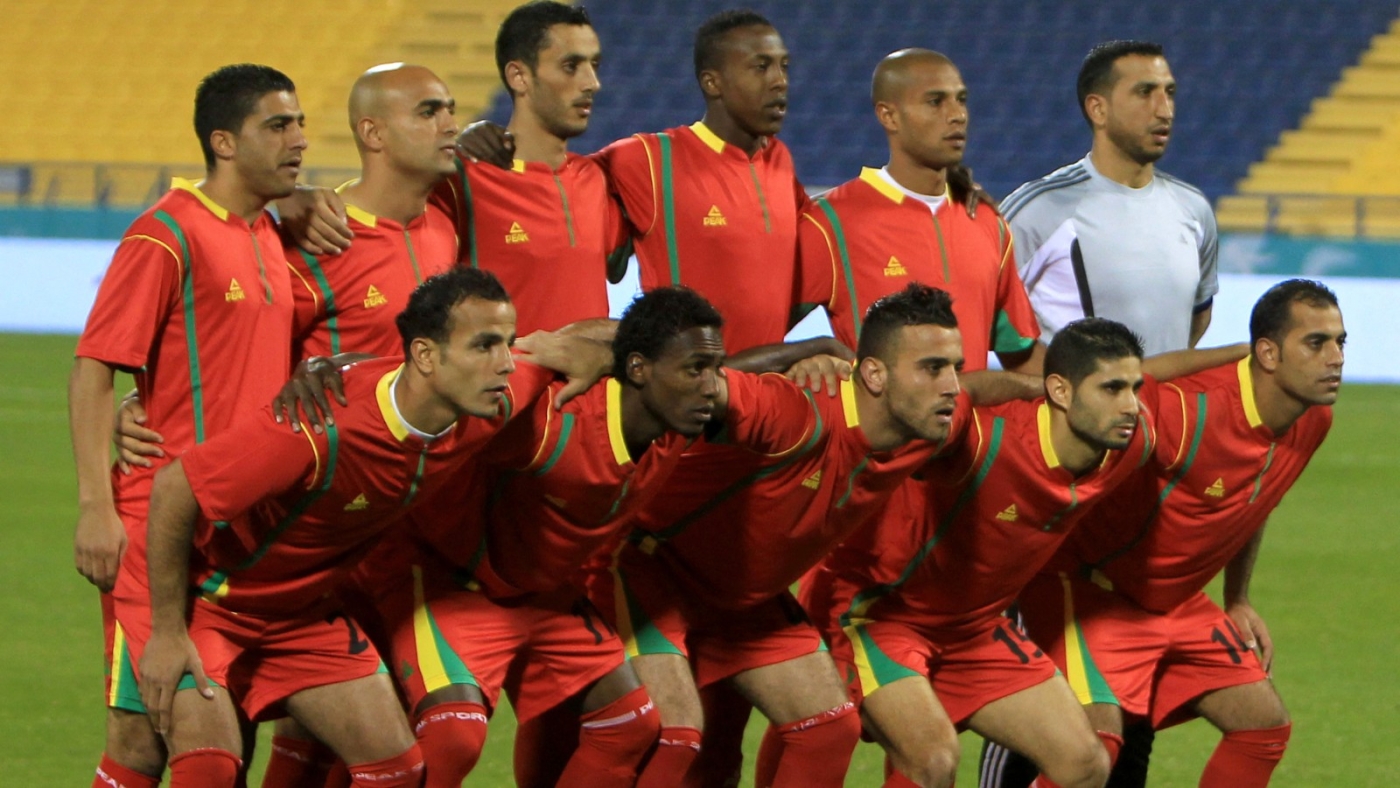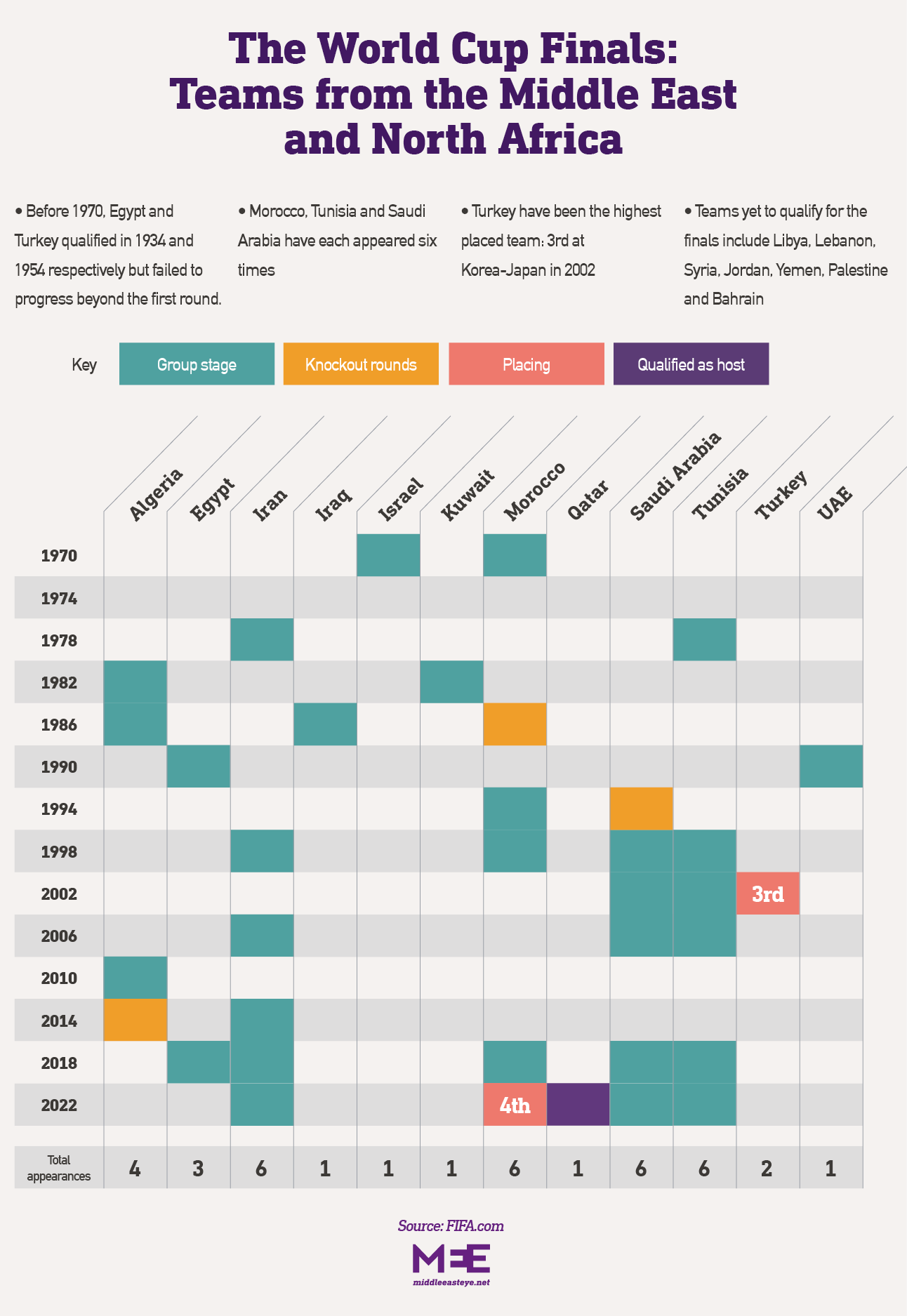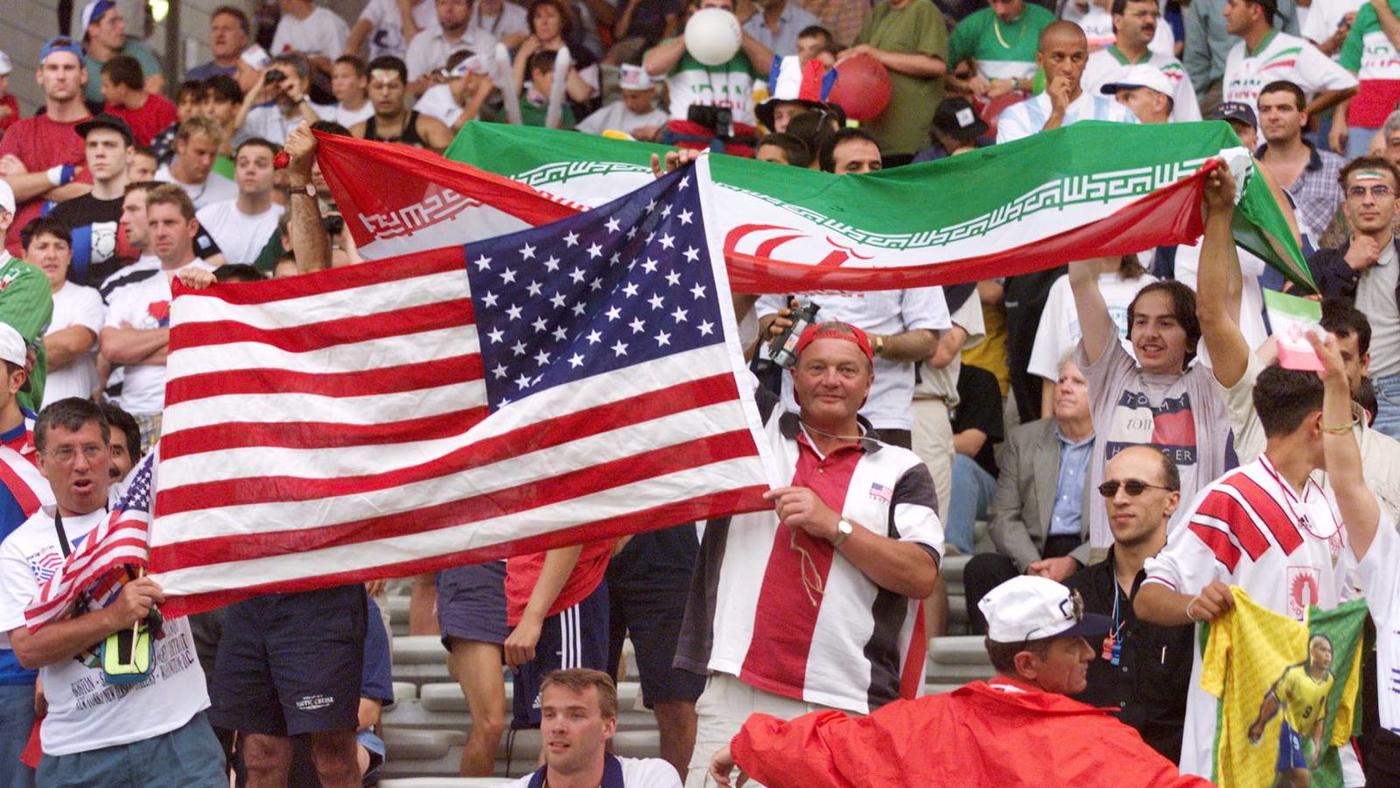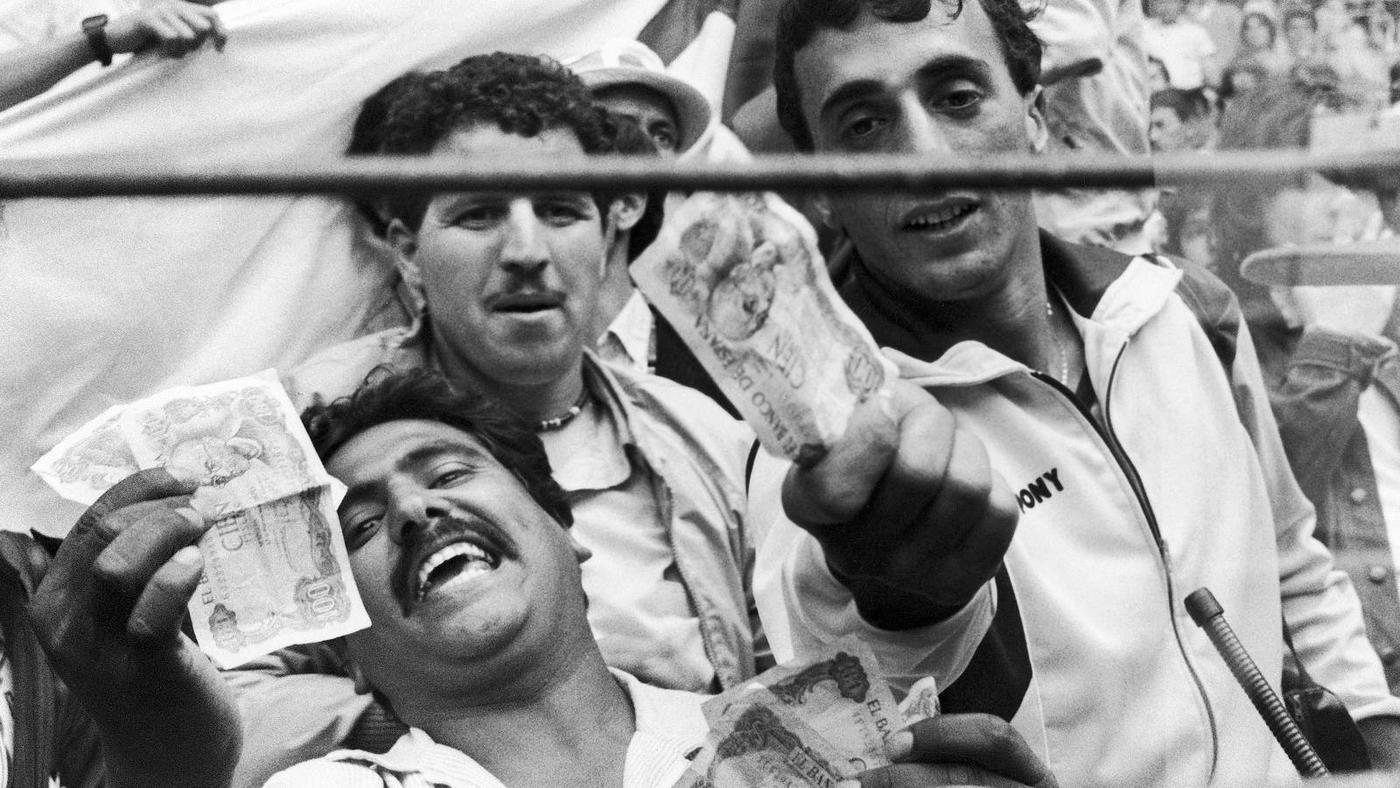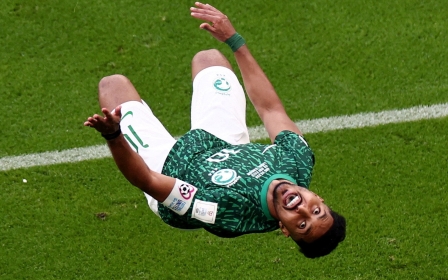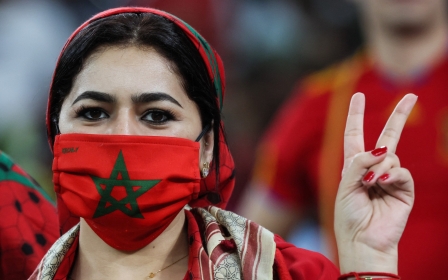The Middle East and the World Cup: 14 key moments for football
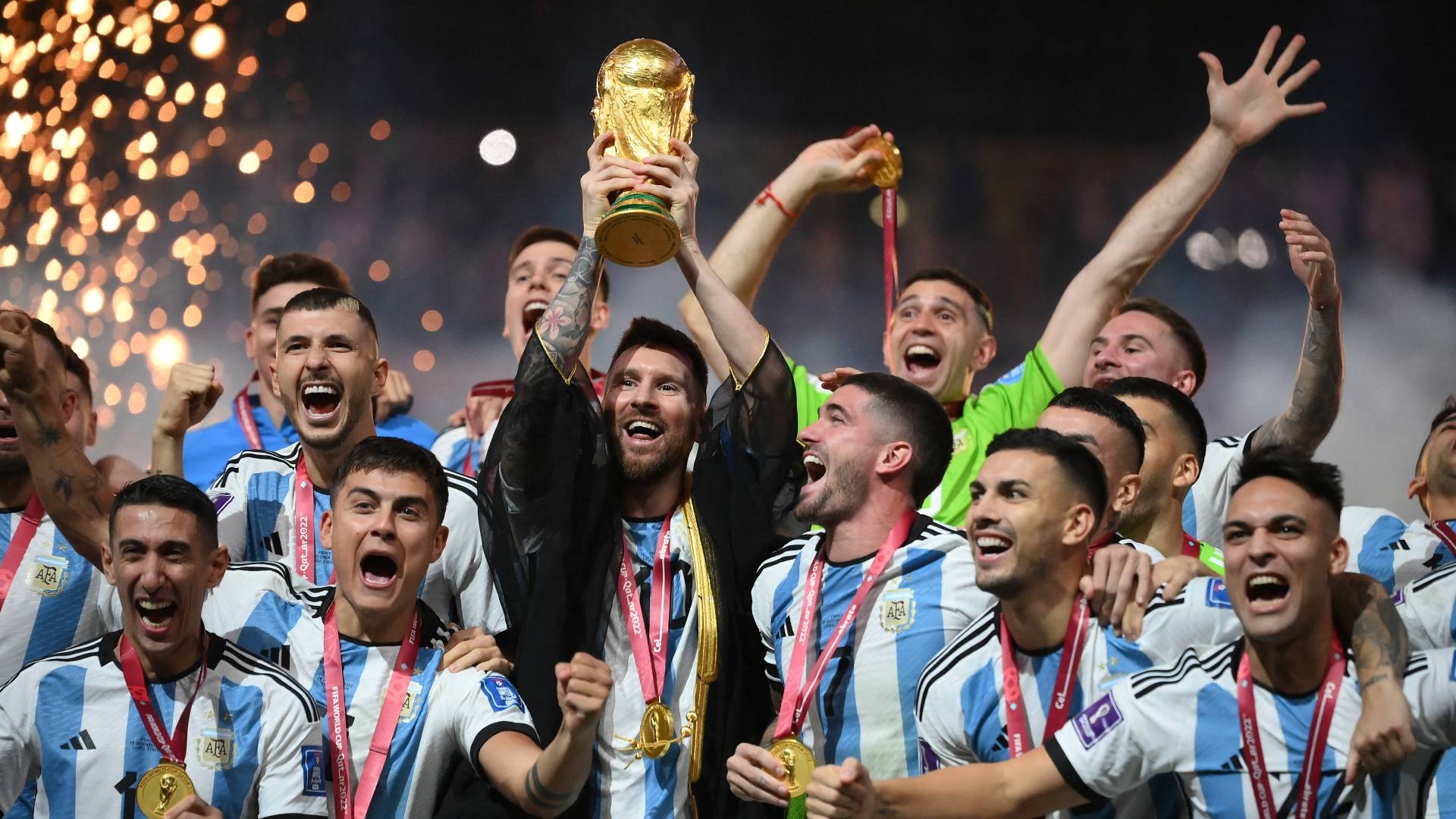
Editor's note: This is an updated version of a previous piece published ahead of the 2018 World Cup in Russia.
The 2022 World Cup, which has just ended in Qatar, with Lionel Messi's Argentina crowned as champions after a memorable final against France, was notable as the first edition of the near-century-old football tournament to be staged in the Middle East.
The finals will also be remembered as a breakthrough tournament for Arab teams.
Saudi Arabia produced one of the biggest shocks in the event's history by beating the eventual winners, Argentina, in their opening match. Tunisia also returned home with a notable win to their name, beating defending champions France in their final group match.
New MEE newsletter: Jerusalem Dispatch
Sign up to get the latest insights and analysis on Israel-Palestine, alongside Turkey Unpacked and other MEE newsletters
But it was Morocco who gave fans from across the Arab world and beyond the most to cheer about. Victory over Belgium in the group stages set Morocco on course for the knockout rounds, where further wins against Spain and Portugal saw the Atlas Lions make history by becoming the first team from Africa - and the Arab world - to reach the semifinals.
Even Iran, while less successful, managed to finish third in their group thanks to an impressive win over Wales, despite competing amid the tumult of protests back home.
Here, MEE looks back at some of the memorable moments and talking points in World Cup history involving teams from the Middle East and North Africa region. Disagree with the choices? Reckon we've left out a favourite goal or team? Then post your comments on Facebook or Twitter.
14. Egypt the pioneers (Italy 1934)
Middle Eastern participation at the World Cup began in Italy in 1934, four years after the inaugural tournament.
Egypt qualified after beating Mandatory Palestine, a team made up of British and Jewish players, 11-2 over a two-legged tie played in Tel Aviv and Cairo before heading across the Mediterannean to the finals. The tournament was overshadowed by the overt propaganda promoting the regime of Italian leader Benito Mussolini, including the home side giving fascist salutes on the pitch. Egypt failed to progress beyond the first round, losing 4-2 to Hungary in Naples.
Decades later, Egyptian goalkeeper Mustafa Kamel Mansour, who broke his nose during the match, said the team had been the victims of biased refereeing. “All the Italian newspapers criticised their referee the next day and admitted he gave the Hungarians their ticket to the next round,” he told the BBC.
Egypt would not now play at another World Cup for 56 years, again in Italy, in 1990.
13. Sheikh gets goal disallowed (Spain 1982)
Kuwait’s only appearance at the World Cup, in Spain in 1982, was remarkable for one thing: the whistle that never was.
The fiasco began when France, already 3-1 up in the group match in Valladolid, advanced yet again on the Kuwaiti goal. Bizarrely, Kuwait's defence stood still, rooted to the spot. French midfielder Alain Giresse shot and scored. Referee Miroslav Stupar pointed to the centre spot to indicate a goal had been scored - and chaos ensued.
Kuwaiti players crowded around the Soviet official, arguing that they heard a whistle and so stopped play (some recordings of the match support their claims). Then Sheikh Fahad al-Ahmed al-Jaber al-Sabah, chief of the Kuwaiti Football Association, came down from the stands and onto the pitch to join the protests.
Players argued with players, and security officials tried to restore order amid the growing melee, which by now was drawing in journalists, substitutes and ever more officials.
Eventually, Stupar disallowed Giresse's goal. To no effect: France went on to win 4-1. Stupar was banned from refereeing again. Fahad was fined: he was killed eight years later in 1990, when Iraq invaded Kuwait, defending the residence of his brother, Kuwait's emir.
12. Fear and failure for Iraq (Mexico 1986)
The mid-1980s was a period of success for the Iraqi football team, including victory at the 1985 Arab Nations Cup, the gold medal at the 1985 Pan Arab Games and qualification for the Olympics.
But life off the pitch was very different: aside from the ongoing war against Iran, the team became increasingly answerable to Uday Hussein, son of Saddam and later notorious for torturing athletes who he felt had failed to perform well enough.
Having topped their first qualification group, Iraq then had to defeat the UAE. They were 3-2 up after the first match but then found themselves 0-2 down with less than five minutes to go, a scoreline that looked set to send them out of the competition, 4-3 on aggregate. Then Karim Saddam found the net, chipping the ball beyond the UAE goalkeeper, allowing an ecstatic Iraq to progress on the away goals rule.
Iraq next defeated Syria in the final round of qualification before heading for Mexico. But their preparations were confused by the sackings of two managers, the Brazilians Edu and Ze Mario, and an order that saw them switch their usual green and white kit for yellow and light blue.
On the pitch, the Lions of Mesopotamia failed to roar: they returned home with three defeats and only one goal, from Ahmed Radhi in a 2-1 loss to Belgium in Toluca, to their name.
On their return to Baghdad, Uday criticised the team but laid the blame mostly on Evaristo, the team's third Brazilian manager, who was subsequently sacked.
11. Israel nearly qualify without a match (Sweden 1958)
Israel was recognised by the United Nations in May 1949. Just a few months later, the new country established on the lands of historic Palestine played its first World Cup qualifying match against Yugoslavia. Israel lost 6-0 in Belgrade and then 5-2 in Tel Aviv, ending the team's hopes of reaching the finals in Brazil in 1950.
Ahead of the 1954 finals, Israel again competed in European qualifying, and lost all four games without scoring against Yugoslavia and Greece.
But it was when Israel moved to the Asian qualifying competition ahead of the 1958 finals that things got complicated.
Israel's first opponents, Turkey, pulled out in protest at being placed in Asian, rather than European, qualifying. Israel advanced to play Indonesia, who refused to play them, as did their next opponents, Sudan. Fifa awarded the matches to Israel, which effectively meant that the team won the Asia-Africa qualifying tournament.
But Fifa then ruled that no team could qualify without playing at least one match, and instead arranged an "intercontinental playoff" between Israel and one of the runners-up from the European qualifiers. After Belgium refused to play, Israel eventually faced Wales, who won 2-0 in Tel Aviv and by the same score in Cardiff to qualify.
Israel faced similar problems during the late 1960s, when North Korea refused to play and were banned by Fifa from the qualification tournament. Israel then reached the 1970 finals in Mexico with a 6-0 aggregate win over New Zealand, only to finish bottom of their group despite draws against finalists Italy and Sweden.
Israel have not qualified since, and since 1994 the country has been a full member of Uefa, playing in the European qualifying competition.
10. Tunisia's first victory (Argentina 1978)
Newly independent Tunisia only played their first match as a Fifa-recognised team in 1957. Just over 20 years later they kick-started a decade of ground-breaking World Cup performances by North African teams - including Algeria in 1982 and Morocco in 1986 - which announced the arrival of Arab teams at the world's most watched sporting event.
In their first match at Argentina 1978, Tunisia were 1-0 down at half-time to Mexico in Rosario. But a comeback in the second half, with goals from Ali Kaabi, Nejib Ghommidh and Mokhtar Dhouieb saw them run out 3-1 winners, the first victory by an Arab or African team in the tournament's history.
Later they cemented their success with a 0-0 draw against then-World Cup holders West Germany and only missed advancing to the next stage by one point after a 1-0 defeat by Poland, who had finished third in 1974.
In 2022, Tunisia beat reigning champions France at Qatar 2022 thanks to a 58th minute goal from Wahbi Khazri, the first time they had won against the former colonial power since the Mediterranean Games in 1971.
9. Palestinian football comes home (Brazil 2014)
Palestine did not have an official team until 1998, when the Palestinian Football Association was formally recognised by Fifa, following the creation of the Palestinian National Authority.
Its participation at international level has been fragmented: frequently the team has had to draw on the Palestinian diaspora outside Gaza and the West Bank to compete, as players in the Palestinian territories have sometimes been unable to obtain exit visas from the Israeli authorities. Several players have been killed during Israeli attacks, including Ayman Alkurd, Wajeh Moshtahe and Shadi Sbakhe during Operation Cast Lead in 2008 and 2009.
On the pitch, the team had to wait more than a decade for their first competitive international at home, a World Cup qualifier in July 2011 against Afghanistan. The match was played in front of 8,000 supporters at the Faisal al-Husseini stadium, just a few metres inside the wall separating the West Bank from Israel.
Wadi Hossam scored with a long shot early in the first half, before Palestine were pegged back and Afghanistan’s Balal Arezou equalised midway through the second. Nonetheless, Palestine advanced on aggregate, having beaten Afghanistan 2-0 in the first leg played a few days earlier in Tajikistan.
In the next round, they hosted Thailand in the West Bank, earning a 2-2 draw, though a 1-0 away defeat ended their hopes of reaching the finals in Brazil. But the Palestinian team's campaign had always been as much about statehood as football.
"Palestinian blood, Palestinian flesh, the Palestinian national anthem on Palestinian territory. It's good. It makes me feel proud," said Jibril Rajoub, the then-president of the Palestinian Football Federation in comments reported by the BBC.
8. Five from region make it through (Russia 2018)
Russia 2018 marked a high watermark for Arab countries at the World Cup, with four reaching the finals through Asian and African qualifying: Egypt, Saudi Arabia, Morocco and Tunisia. (The same number would compete in 2022, but Qatar qualified automatically as hosts.)
With Iran also making the finals, the tournament appeared to offer a chance for countries from the region to make their mark, but none was able to progress beyond the group stages.
Saudi Arabia and Egypt, both in Group A, finished respectively third and fourth; Iran and Morocco in Group B ended up with third and fourth; and Tunisia were third in Group G.
But overall the trend is positive. In Qatar, several of the same teams earned notable victories. As the chart above shows, MENA teams only qualified for the World Cup finals on six occasions up to and including Argentina 1978, the 11th tournament. For the subsequent 11 finals, that figure rises to 31 (32 if including Qatar as host nation).
7. The rise of Saudi Arabia (Qatar 2022)
Saudi Arabia have arguably been the most consistent team from the region at the World Cup finals in recent years, having qualified for six of the last eight tournaments.
They made an auspicious debut at USA 1994, becoming only the second team from the region to advance to the knockout stages. Of particular note was Saeed al-Owairan's rout of the Belgium defence in Washington, when he ran from his own half to score the goal of the tournament. (By France 1998 he had been dropped, allegedly for partying too much.)
But it was in neighbouring Qatar that Saudi Arabia really stamped their mark on the World Cup with a shock win over Argentina in their opening group match. Lionel Messi's early penalty had given the South American side the lead and the first half offered no clue as to what was about to happen.
But in quick succession at the start of the second half, Saleh al-Shehri equalised and then Salem al-Dawsari fired Saudi Arabia in front. For the next 40-plus minutes they hung on, with goal-line clearances and outstanding saves by goalkeeper Mohammed al-Owai keeping Messi and his teammates at bay.
The previous month, Crown Prince Mohammed bin Salman told his country's players that no one expected them to win any points at the tournament. After the match Saudi Arabia declared a public holiday.
6. Iran vs USA: Football 1, Politics 0 (France 1998)
It was described in advance as the “most politically charged game in World Cup history”: Team USA versus Team Melli. Two countries which had ceased diplomatic relations two decades ago, meeting on a football pitch in France.
And while the first encounter between the two teams took place during one of the less frosty moments in US-Iranian relations, some politicking was inevitable - much of it among rival Iranian political groups. Security was tight at the stadium in Lyon, as groups of Iranians from the National Council of Resistance, the Washington Post reported, tried to unfurl banners – which were confiscated by French police - while trading insults with pro-government supporters in the crowd. On the pitch relations were warmer as the Iranian players carried white roses as a sign of peace and the teams posed together for photos.
The game itself stoked little controversy or incident: Iran were two up with just six minutes to go, thanks to goals from Hamid Estili and Mehdi Mahdavikia. Brian McBride scored a consolation for the Americans six minutes from the end. Both teams fared less well for the rest of the tournament, failing to make it out of the group stages.
The rematch took place at Qatar 2022, when the teams were drawn in the same group: off-the-field issues between the two nations included the collapse of nuclear talks, US sanctions, Iran's support for Russia in the Ukraine war, and the ongoing protests in Iran.
The United States Soccer Federation briefly used an altered flag of Iran in a social media post, angering Tehran. US coach Gregg Berhalter apologised and said that his players and staff had no idea about the doctored image. Before the match Alexi Lalas, who played in the 1998 game, tweeted: "We made the mistake of underestimating how much the historically contentious relationship between our countries motivated, fuelled, and informed Iran's performance. It was more than a game to them. Here's hoping we learn from history."
Ahead of the game, social media feeds - which didn't exist 24 years before - showed fans of the rival teams coming together for photos and, in one instance, a dance competition. A goal from Christian Pulisic saw the US progress to the knockout stage, sending Iran out of the competition.
5. Team Melli: Football 0, Politics 1 (Qatar 2022)
For two months before the start of the Qatar 2022 tournament, Iran had been rocked by female-led protests, sparked by the death in custody of 22-year-old Mahsa Amini, who was arrested for allegedly wearing her headscarf “inappropriately”. The protests prompted a harsh response from the authorities, with some protesters killed in the ensuing crackdown, and others sentenced to death.
On the day before Iran’s opening Group B match against England, Ehsan Hajsafi told a news conference: “My condolences to all the mourning families in Iran … we stand with them and share their pain … we must accept that conditions in our country are not right and our people are not happy. My people are sad and our presence here does not mean that we cannot be a voice for them or should not respect them.”
Ahead of the game itself, which Iran lost 6-2, the team appeared not to sing the republic's national anthem in what was widely interpreted as a display of support for the protesters. Meanwhile some of the sizeable fanbase booed the anthem from the stands. Outside the Khalifa International Stadium, chants of "Say her name, Mahsa Amini" reverberated.
The following Friday, Iran faced Wales. Some of the Iranian players this time sang the national anthem. On social media, some Iranians suggested that supporters of the government in Tehran had applied pressure and subjected the players and their families to threats.
Sina Azodi, an Iranian adjunct professor at George Washington University, said: "In the Wales match, Team Melli players seemed to have been either coerced or convinced into lip-syncing the anthem, perhaps to ensure a handsome welcome by the authorities."
4. Turkey almost go all the way (Japan-South Korea 2002)
Turkey have only reached the World Cup finals on two occasions. In 1954, they beat South Korea, but were no match for eventual winners West Germany who, due to a curious format, Turkey played - and lost - against twice.
In 2002 however, Turkey proved to be the surprise package of the tournament, scoring 10 goals in a seven-game run which saw them eventually beat co-hosts South Korea 3-2 to finish in third place in a match in which Hakan Sukur, now living in self-imposed exile in the United States, scored the fastest ever World Cup final goal in 10.89 seconds.
Turkey went toe-to-toe twice with the eventual winners Brazil, losing to the great team of Ronaldo, Rivaldo and Ronaldinho just 1-0 in the semifinals, and going down 2-1 due to a late Rivaldo penalty in the group stage.
Turkey had finished that match with nine players after Hakan Unsal was sent off for kicking the ball in frustration at Rivaldo in the last few minutes. Rivaldo collapsed, clutching his face, in what was widely seen as play-acting. The contentious decision prompted outrage among Turks, mostly aimed at South Korean referee Kim Young-Joo.
Referencing Turkey's involvement in the 1950s Korean War, Haluk Ulusoy, president of the Turkish FA, said: "We sacrificed 1,000 soldiers here to defend the South Koreans and one Korean has now killed 70 million Turks. We love Koreans, but that man cannot be a referee."
Turkey recovered to reach the last 16 by drawing with Costa Rica and beating China. They then beat co-hosts Japan 1-0, before producing their best performance of the tournament in the quarterfinals to knock out Senegal, with Ilhan Mansiz scoring the only goal of the game in extra time.
3. Morocco make it to the semifinals (Qatar 2022)
Morocco made history at the 2022 World Cup by becoming the first African country to reach the semifinals, turing Doha into a carnival of red and green as Arab support swelled with each victory over European opposition.
Little was expected from the Atlas Lions going into the tournament. Coach Walid Regragui had only been appointed three months earlier and a goalless draw with Croatia in their opening match offered few clues as to what lay ahead.
Morocco's second match, against a Belgian side ranked second in the world, changed everything. Regragui's men out-fought, out-ran, and out-played their opponents, with second half goals from Abdelhamid Sabiri and Zakaria Aboukhlal sealing a famous victory.
A further win over Canada sent them through to the knockout stages as group winners - with highly fancied Spain posing the next obstacle. Morocco stood firm as the match remained goalless over more than 120 minutes of normal time and extra time, squandering chances of their own to win the match.
But on penalties, Morocco were nerveless. Goalkeeper Yassine Bounou saved twice and watched another cannon off the post, before Morocco's Madrid-born star man Achraf Hakimi dinked the winning kick straight down the middle.
Morocco continued to grow in confidence with previously unheralded players such as Azzedine Ounahi and Sofyan Amrabat emerging as breakout stars of the tournament, as Portugal were beaten 1-0 in the quarterfinal to set up a last four clash with defending champions France.
Morocco fell behind to an early goal, but then gathered momentum to push France onto the defensive for much of the match. But to no avail: a second French goal on 79 minutes ended Morocco's dream of reaching the final.
Saturday's third-place playoff - a rematch with Croatia - also ended in defeat. But that was not enough to dim Moroccan pride in the team's performances.
Regragui said afterwards:"Something really touches me when I see pictures of our fans, the children, the king celebrating in the street. Football allows you to dream, and we have allowed our children to keep these dreams alive and that is priceless. It means more to me than winning a World Cup."
2. Algeria and the 'Disgrace of Gijon' (Spain 1982)
Algeria's first World Cup final appearance in Spain in 1982 changed international competitive football for ever.
The Fennecs first game was against then-European champions and twice-World Cup winners West Germany. Rabah Madjer nudged Algeria into a 54th-minute lead, before German captain Karl-Heinz Rummenigge responded to draw the teams even. But Lakhdar Belloumi scored again for Algeria a minute later - and they held on for one of the biggest World Cup shocks.
Algeria lost their subsequent match against Austria 2-0, before beating Costa Rica 3-2 in their final match. That meant they would only fail to progress out of the group stages if Germany beat Austria by one or two goals the following day in the last match of the group.
Germany took the lead after 10 minutes, only for the game to then become a kickabout mutually convenient to both sides in what eventually became known as the "Disgrace of Gijon". As The Guardian's Stephen Bierley reported at the time: "This was European cooperation taken to ridiculous limits." The 1-0 result served the interests of both teams - but the anger was just beginning.
Commentators from Germany and Austria condemned the players. Supporters said they were ashamed of their teams. Algerian fans later called the match "the Anschluss" in reference to the 1930s unification of Austria and Nazi Germany. Algeria protested to Fifa but the result was allowed to stand.
The charges of conspiracy were not proven - but the sense that Algeria had been shortchanged was so intense that it resulted in one fundamental change to football: that the final matches in any competitive tournament must now kick off simultaneously to avoid any suspicion of collaboration.
1. Football finds a new stage (Qatar 2022)
The climate would be too hot. The country would be too small. The national team had never qualified for a World Cup.
Those were just some of the manifold reasons why the awarding of the World Cup to Qatar in 2010 sparked controversy and criticism, along with questions about the process by which the small Gulf state had been chosen, and concerns for the safety and human rights of migrant workers tasked with building the stadiums and supporting infrastructure. The head of Qatar's World Cup committee would eventually say that an estimated 400 to 500 workers had died while working on construction projects linked to the tournament.
But the tournament has broken new ground. It was the largest ever sporting event to be held in the Middle East and by a Muslim country, including an opening ceremony that featured Bedouin and quotes from the Quran. As with Japan-South Korea in 2002 and South Africa in 2010, staging it in a Gulf state broke the decades-old switching of the tournament hosts between the Americas and Europe.
Qatar 2022 was the first to be held in November and December, suggesting the possibility of future tournaments taking place outside the traditional Northern Hemisphere summer months. It was the most compact yet, with the furthest distance between stadiums less than 50km (for Russia 2018, it was around 2,500km).
The tournament has also given regional footballing nations something to work towards during the past decade: the tournament saw strong performances by the likes of Saudi Arabia, Morocco and Tunisia. And fans from the region have travelled to support the teams from North Africa and the Gulf, frequently outnumbering opposition supporters and ensuring their voices have been heard.
Middle East Eye delivers independent and unrivalled coverage and analysis of the Middle East, North Africa and beyond. To learn more about republishing this content and the associated fees, please fill out this form. More about MEE can be found here.


